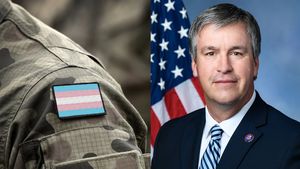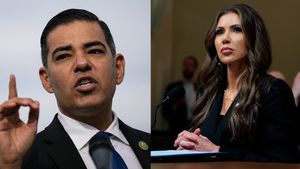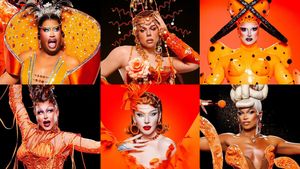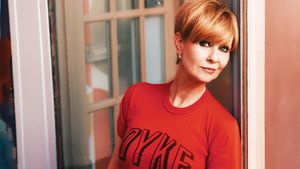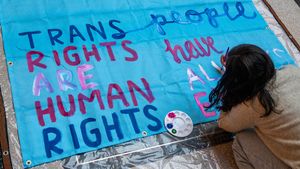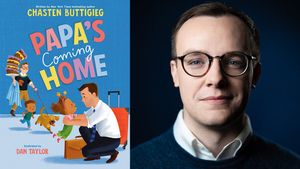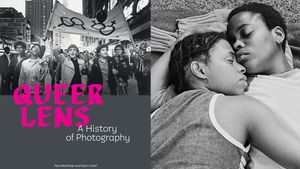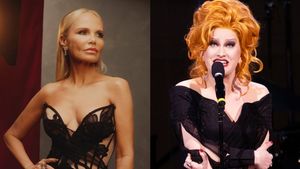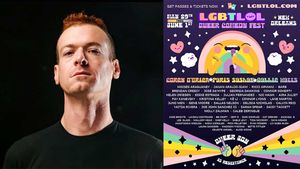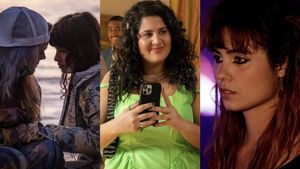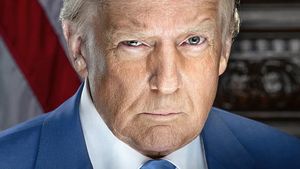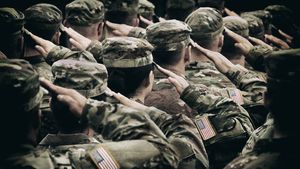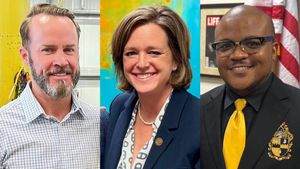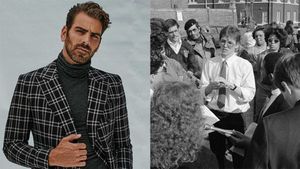
Max kegfire/Shutterstock
The internationally recognized Pride Month may be on its way to a close, but there are other celebrations on the way to highlight queer people in marginalized races.
Among the celebrations outside of the traditional Pride Month is Black Pride, which originated as Black Pride Week in Washington DC and has gone on to have various celebrations and integrations throughout the rest of the country.
Keep reading to find out what Black Pride is, why it’s important, and when and where you can find a Black Pride celebration.
What is Black Pride?

HIV in View/Shutterstock
Black Pride is a movement created in response to dominant white cultures and ideologies. It encourages Black people to celebrate their own culture and heritage. That said, even Black Pride has work to do to promote inclusivity within the community when it comes to people who identify on the LGBTQ+ spectrum.
“The concept of intersectionality, when it comes to being Black and queer, is a whole different experience, because it’s a double-whammy,” says Emani 'King' Mack, one of the event organizers with San Diego Black Pride. “The importance of Black Pride is to actually have a safe space where we can be ourselves and celebrate, to congregate, to empower each other by just being around each other.”
It’s also a chance to address the overall economic, social, and health equality that disproportionately affects Black LGBTQ+ households. A recent report from the Bureau of Labor Statistics shows the median earnings of Black people averaged $908 per week, as opposed to their White counterparts who averaged $1,157 and Asians who averaged $1,505.
The Human Rights Campaign (HRC) further detailed that LGBTQ+ workers overall earn only 90 cents on the dollar as compared to other typical workers, and that Black and Latine transgender adults are more likely to live in poverty than transgender people in other races. Their report found that those who identified as both LGBTQ+ and had a BIPOC race or ethnicity reported lower wages and larger wage gaps as opposed to other workers in the United States.
Related: 10 harmful myths that fuel transgender misinformation
The importance of highlighting these inequalities

Kitreel/Shutterstock
It’s important to highlight these types of pay gaps because it helps further the equality we all seek. Even among women, the HRC reported that LGBTQ+ Asian/Asian Pacific Islander (API) women earned the same or about the same as a typical worker on the dollar. White LGBTQ+ women earn an average of 96 cents on that same dollar. Black LGBTQ+ women only earn 85 cents on the same dollar, which goes down to 75 cents for Native American LGBTQ+ women and even further to 72 cents for Latine LGBTQ+ women.
The reason Black Pride exists is to help bring awareness to issues seen in wage gaps, but also to other discrepancies like health care and the disproportionate ratio of STIs seen in Black people. The CDC has long documented the disparities in sexual health, and their 2022 overview of STIs post-Covid noted that non-Hispanic Black or African American people made up 31% of all cases of chlamydia, gonorrhea, and syphilis, despite only making up roughly 13% of the overall population.
Worse, Black/African American people and Hispanic/Latino people also made up around 70% of all new HIV infections in the same year. Out of the estimated 31,8000 infections, Black/African American people had the most infections at just under 12,000, whereas Hispanic/Latino people made up 10,500 and White people had 7,6000. Again, Black/African American people only account for 13% of the total US population, which makes this discrepancy even worse.
When did the Black Gay Pride Movement start?

CarlosDavid/Shutterstock
The first official Black Gay Pride event was held in Washington DC in 1991. The Center for Black Equity says that “while the mainstream gay pride movement, often perceived as overwhelmingly white, has focused much of its energy on same-sex marriage, the Black Gay Pride movement has focused on issues such as racism, homophobia, and lack of proper health and mental care in Black communities.”
Prior to the first official event in 1991, DC Black Pride tells of the ClubHouse in Washington DC that ran as a nightclub founded by Black members of the DC’s LGBTQ+ community that ran from 1975-1990 and became popular for its signature “Children’s Hour” event held every year on Memorial Day. After the ClubHouse closed in 1990, Welmore Cook, Theodore Kirkland, and Ernest Hopkins got together to both carry on the tradition and bring awareness to the growing HIV/AIDS epidemic running rampant through their community.
What started as a singular-day event that drew in 800 people grew into a weekend event the following year. As it grew in the '90s, it birthed the nonprofit Black Lesbian & Gay Pride Day, Inc. (BLGPD) to operate as an all-volunteer governing body of DC Black Pride, which is now regarded as the main source of the Black Gay Pride Movement. Today, the weeklong DC Black Pride event draws in more than 500,000 people and continues to raise awareness and funding for HIV/AIDS.
“Black Pride gives us a sense of, ‘It’s okay to be who you are,’” says King. “Being Black and being gay is okay. You’re celebrated, and you have people around you. There’s really no education around HIV, and growing up as a Black man, we’re told that being black is a strike, being a man is another strike, and being gay is another strike. You have to grow up and have a sense of confidence that nobody has. Black Pride is telling yourself you’re loved, you’re valued, and there’s a safe space for you.”
Where can I find a Black Pride event?

SMC Photo/Shutterstock
Truthfully, these days it might be easier to ask where you can’t find a place to celebrate Black Pride as opposed to finding a place where you can. Some of the more popular options in the U.S. are Atlanta Black Pride, NYC Black Pride, New Orleans Black Pride, and Los Angeles Black Pride.
The movement, however, has also expanded outside of just the United States. You can also find Kingston and Montego Bay Black Pride in Jamaica, UK Black Pride in England, Paris Black Pride in France, and Pride in Lagos, Nigeria. Check out the full list of Black Pride options here.
When does Black Pride happen?

Gregory Reed/Shutterstock
Unlike the full Pride Month that takes up all of June, Black Pride events happen at all times of the year. Although there are a number of Black Pride events that have already passed, here’s a list of events still to come in the rest of 2024, as well as their theme and when they happen:















































































